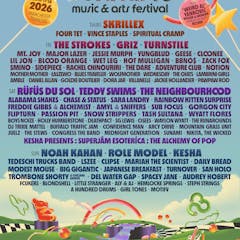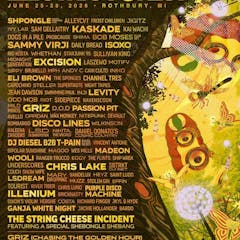
Best Passion Pit Songs of All Time - Top 10 Tracks
Pop
Best of Passion Pit
Passion Pit has performed in venues such as:
Passion Pit has upcoming events in
Without further ado, here are Passion Pit top 10 tracks of all time:
1. Sleepyhead
2. Take a Walk
3. Little Secrets
4. Carried Away
5. Sleepyhead 2025
6. The Reeling
7. Where I Come From
8. Grenade - Passion Pit Remix
9. Moth's Wings
10. Constant Conversations
Passion Pit Details
In 2007, when Michael started sharing Passion Pit songs online, one reoccurring note of feedback was, “I can’t tell if the singer’s a guy or a girl.” This didn’t bother Michael. In fact, he appreciated the anonymity. He was eager to share his music, but he wasn’t ready to share himself. Over the course of three albums, however, Michael has matured as A person and an artist. And on Kindred, he’s done hiding.
Michael and I met when our bands toured together in 2009. He had just released Manners and was beginning to get the sort of attention he’d been craving and fearing since he was four. We had that moment of mutual recognition, when the rhythm of conversation—unobstructed by having to constantly stop and explain what you mean—is able to get off the ground, and talking starts to feel like playing music. We were kindred spirits. And throughout our friendship, I’ve seen him go through an intense slew of personal experiences, which have ultimately readied him for the challenge and opportunity that Kindred represents. To step up. To own it.
The music on Kindred is as Passion Pit as ever—more so, if possible—but the stacked shrieking-child vocals and distancing reverb and esoteric lyrical moments are gone. The veils are peeled away.
In addition to shyness, Michael had his own breadth of interests to contend with. His mind is always darting around. He’s intense, mercurial, quixotic, often alarmingly hyperactive. How does a guy like this confine himself to one strict electronic dance-pop aesthetic for the better part of a decade? What about his love of jazz, opera, musical theater, drone? Was Passion Pit his project, or was this some 2001 situation where the spaceship was starting to take over? Was there a way to reconcile his conflicting feelings and use them in his work? To reclaim agency over his art and his life?
Michael’s songwriting process for Passion Pit has always been to filter and reshape. Many sounds on Kindred that you’d assume are synths are actually his voice, minced on a computer, morphed by pedals. Michael samples Michael. It’s an ability to look at himself from a slight distance and tweak and adjust, which also extends to his character off record.
He aspires to “create worlds” with his music, and fittingly his studio resembles the Hadron Collider. There are buttons and switches and knobs on everything, his restless mind echoed in his workstation. He makes his weird ‘Hands Across America’ utopian bangers out of broken Casios and diaristic candor. (“If you’re going to be honest with your music, you might as well be brutally honest.”) The creation of “Five Foot Ten” entailed Michael pressing the same key on a cheap ‘90s synth while cycling through 160 different sounds, then running them all through his Russian space station-looking Eurorack modules. “Looks Like Rain” uses a sampled 808 kick drum as a chordal instrument. Everything is run through a filter and Passion Pit itself is but a larger filter. It’s Michael’s life run through the psyche of his inner 19 year old. The young and insecure part. The part that only ten years ago was nine.
Programming is a major element of Passion Pit, but Michael’s also a classicist, in love with traditional pop structures. You can hear it in his bridges. The bridge that alley-oops to the final chorus in “Five Foot Ten.” The funky bridge of “Where the Sky Hangs,” with its ‘90s quarter note strings. The drummer boy bridge of “All I Want.” Where many songs begin to yawn and say, “Look at the time,” Passion Pit songs get a second wind: “Don’t go yet! Let’s watch the sunrise!”
The last song on Kindred was the first he officially recorded for the album. “Ten Feet Tall” shares chords and melody with its less tall, double-time counterpart, “Five Foot Ten,” and is the only song to survive an aborted session at a studio in the Berkshires (“We should have never left the city.”) Chris, one of the producers, John Bonham’d dents into the drumheads while Michael played B3 organ, directing the studio assistant to turn on and off the Leslie speaker with a pidgin morse code of eye contact. (“Now,” his eyes would widen.) Michael’s baffling vocal range suggests a paradox you might call ‘natural autotune’; but “Ten Feet Tall” is the first time he uses actual autotune on a lead vocal. On an album full of clear vocals, this is the obvious exception. It’s also a great example of how he repurposes sound: using top 40 signifiers for outré ends, crushing weird natural and synthetic detritus together into diamond-solid pop.
Kindred is the culmination of a process that began on Fayette St. in Cambridge, Massachusetts, the summer before his sophomore year when Michael ordered a midi controller—simply “to slave a synthesizer I already had”—and it came with a free CD of basic programming software. This was when he first began trying to pit—the second half of the name has always seemed both verb and noun—his confusion and pain against the magical twinkling pop in his head. To get it down on record, once and for all.
On Kindred, the child is at the head of the table. To get him there, to do his perspective justice and to share it with the world, Michael himself had to step up and mature. As on records past, the child feels alone, though he’s surrounded by people. But you’ll notice something significant has changed. He is looking straight into the camera.
Upcoming Events
Saturday, June 13
Thursday, June 25
Sunday, July 19



